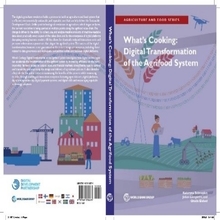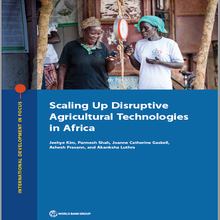Deviance, and Community Engagement
- The analytics and data pipelines from DiCRA feed into numerous use cases including but not limited to Drought Early Warning Systems, Impact Evaluation of technical and policy interventions, designing targeted advisors, and long-term agriculture and food system budgeting, planning, and operations.
- DiCRA was piloted for Telangana state in India, and is now being scaled to 5 other states in India and to other geographies around the globe.
The impact of climate change on agriculture is multifold, affecting crop yield, nutritional quality and livestock productivity. Using remote sensing and pattern detection algorithms, DiCRA is able to identify farms that are resilient to climate change and those that are highly vulnerable. In particular, it harnesses open-source technologies to facilitate analysis and insights sharing on climate resilience, based on empirical inputs crowdsourced from hundreds of data scientists and citizen scientists on best performing farms.
- Within a three-month period, DiCRA gained more than 500 citizens and scientists from local digital ecosystems to support climate action in 112,077 square km of land in the state of Telangana.
- As highlighted in a report authored by the Digital Public Goods Alliance, International Telecommunications Union and the World Meteorological Organization, a number of different yet interconnected stakeholders are the holders of climate data.
Background
As co-host of the Digital Public Good Alliance, UNDP is accelerating efforts to surface new technological frameworks required to drive climate adaptation and mitigation to achieve the goals outlined in the Paris Agreement on climate change. DiCRA now joins more than 100 digital solutions that adhere to privacy and other applicable laws and best practices to help attain the Sustainable Development Goals (SDGs). Data in Climate Resilient Agriculture (DiCRA): Combining Data4Policy, Positive Deviance, and Community Engagement.
countries in reaping the benefits of digital technology while mitigating the risks.
As co-host of the Digital Public Good Alliance, UNDP is accelerating efforts to surface new technological frameworks required to drive climate adaptation and mitigation to achieve the goals outlined in the Paris Agreement on climate change. DiCRA now joins more than 100 digital solutions that adhere to privacy and other applicable laws and best practices to help attain the Sustainable Development Goals (SDGs). Data in Climate Resilient Agriculture (DiCRA): Combining Data4Policy, Positive Deviance, and Community Engagement.
As part of UNDP’s Digital Strategy, digital public goods such as DiCRA are part of the next frontier of digital public infrastructure, which will drive sectoral transformation and the concerted effort towards achieving the Paris Agreement goals on climate change.
UNDP’s Digital Strategy, outlines three interconnected objectives through which UNDP will support- UNDP (2022) DIGITAL STRATEGY2022 — 2025 # 52 p.
- UNDP (2022) UNDP–Data for Policy Compendium of Climate Smart Agriculture Practices from the Farming Communities of Telangana`# 45 p.
countries in reaping the benefits of digital technology while mitigating the risks.
- First, amplify development outcomes by embedding digital into all dimensions of our work; experimenting with new approaches and tools, scaling promising solutions, and applying foresight to understand possible futures.
- Second, support societies in their efforts to create more inclusive and resilient digital ecosystems, ensuring they are rights-based and leave no one behind.
- And third, continue to transform and lead by example to meet current and future technological needs. That means prompting #FutureSmartUNDP personnel to continue upgrading their digital skills and using data strategically – helping to future proof the organization.
Related:
30 March 2023- 12:30- 14:00 CEST. InfoPoint Hybrid Conference: "Agricultural data-driven strategies for development, food security, and resilience"
Tune in to Digital Agriculture: New Frontiers for the Food System, a dynamic event with food tech innovators and leaders from the private and public sector who will explore the transformational potential of digital agriculture to feed the world in a way that delivers healthier people, healthier economies and a healthier planet.
The book “What’s cooking: the digital transformation of the agrifood system” which proposes a roadmap through which data and digital technologies can lead to efficient, equitable and environmentally sustainable food systems, and looks at the role of the public sector in ensuring these outcomes are maximized.
Citation “Schroeder, Kateryna; Lampietti, Julian; Elabed, Ghada. (2021). What's Cooking : Digital Transformation of the Agrifood System. Agriculture and Food Series;. Washington, DC: World Bank. © World Bank. https://openknowledge.worldbank.org/handle/10986/35216
This study—which includes a pilot intervention in Kenya—aims to further the state of knowledge about the emerging trend of disruptive agricultural technologies (DATs) in Africa, with a focus on supply-side dynamics.
Citation “Schroeder, Kateryna; Lampietti, Julian; Elabed, Ghada. (2021). What's Cooking : Digital Transformation of the Agrifood System. Agriculture and Food Series;. Washington, DC: World Bank. © World Bank. https://openknowledge.worldbank.org/handle/10986/35216
This study—which includes a pilot intervention in Kenya—aims to further the state of knowledge about the emerging trend of disruptive agricultural technologies (DATs) in Africa, with a focus on supply-side dynamics.
The first part of the study is a stocktaking analysis to assess the number, scope, trend, and characteristics of scalable disruptive technology innovators in agriculture in Africa.
From a database of 434 existing DAT operations, the analysis identified 194 as scalable.
The second part of the study is a comparative case study of Africa’s two most successful DAT ecosystems in Kenya and Nigeria, which together account for half of Sub-Saharan Africa’s active DATs. Scaling Up Disruptive Agricultural Technologies in Africa concludes by establishing that DATs are demonstrating early indications of a positive impact in addressing food system constraints. Read more




No comments:
Post a Comment